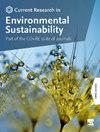评估澳大利亚主要食品公司与环境可持续性相关的政策和做法,2023 年
IF 3.7
Q2 ENVIRONMENTAL SCIENCES
Current Research in Environmental Sustainability
Pub Date : 2024-01-01
DOI:10.1016/j.crsust.2024.100269
引用次数: 0
摘要
私营部门,包括食品制造商、零售商和快餐店,在减少食品系统对环境的影响方面可以发挥重要作用。对公司行动进行监测和设定基准,可以确定良好做法的领域,有助于增强食品行业在这一领域的责任感。本研究旨在评估澳大利亚主要食品公司在环境可持续性方面的政策和实践。我们通过对全球 INFORMAS 网络开发的监测框架进行试点测试来开展评估。该框架旨在评估公司在 10 个领域的政策和实践的全面性、具体性和透明度:环境可持续发展总体战略"、"包装"、"温室气体排放"、"能源"、"水"、"生物多样性"、"食物损失和浪费"、"环境合规"、"动物源产品 "以及 "与其他组织的关系"。我们选择了 19 家在澳大利亚经营的最著名食品公司进行评估。我们使用评估框架为每家公司打分(满分 100 分)。公司得分从 2 分到 58 分不等(中位数:31/100)。各公司普遍在多个领域做出了有力承诺,但与这些承诺相关的绩效报告却很有限。公司在 "温室气体排放 "领域得分最高(中位数:58/100),在 "动物源产品"(中位数:10/100)和 "水 "领域(中位数:23/100)得分最低。总体而言,研究发现公司在环境可持续发展方面的报告实践存在相当大的差异。研究结果表明,澳大利亚的食品公司在采用综合方法解决环境可持续性问题方面远未达到良好的实践水平。本文章由计算机程序翻译,如有差异,请以英文原文为准。
Assessing major food companies in Australia on their policies and practices related to environmental sustainability, 2023
The private sector, including food manufacturers, retailers, and quick-service restaurants, has an important role to play in reducing the environmental impact of food systems. Monitoring and benchmarking of company actions can identify areas of good practice and contribute to increasing the accountability of the food industry in this area. This study aimed to assess major food companies in Australia on their policies and practices related to environmental sustainability. We conducted the assessment by pilot testing a monitoring framework developed by the global INFORMAS network. The framework was designed to assess the comprehensiveness, specificity and transparency of company policies and practices in 10 domains: ‘overarching environmental sustainability strategy’; ‘packaging’; ‘greenhouse gas emissions'; ‘energy’; ‘water’; ‘biodiversity’; ‘food loss and waste’; ‘environmental compliance’; ‘animal-sourced products'; and ‘relationships with other organisations'. We selected 19 of the most prominent food companies operating in Australia for assessment. Each company was allocated a score (out of 100) using the assessment framework. Company scores ranged from 2 to 58 (median: 31/100). Companies generally had strong commitments in place across several domains, but reporting of their performance associated with those commitments was limited. Companies scored highest in the ‘greenhouse gas emissions' domain (median: 58/100), and lowest in the ‘animal-sourced products' (median: 10/100) and ‘water’ domains (median: 23/100). Overall, the study identified considerable variability in company reporting practices related to environmental sustainability. The findings indicate that food companies in Australia are falling well short of good practice in implementing a comprehensive approach to addressing environmental sustainability.
求助全文
通过发布文献求助,成功后即可免费获取论文全文。
去求助
来源期刊

Current Research in Environmental Sustainability
Environmental Science-General Environmental Science
CiteScore
7.50
自引率
9.10%
发文量
76
审稿时长
95 days
 求助内容:
求助内容: 应助结果提醒方式:
应助结果提醒方式:


